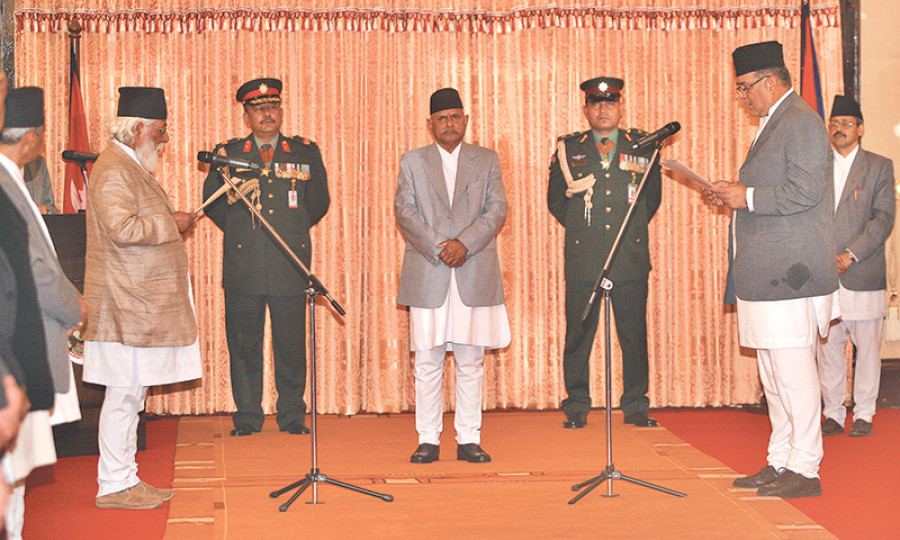Miscellaneous
Court disqualifies Karki as CIAA chief
In a landmark verdict, the Supreme Court on Sunday disqualified Lokman Singh Karki as the chief of the Commission for Investigation of Abuse of Authority.
Anil Giri
In a landmark verdict, the Supreme Court on Sunday disqualified Lokman Singh Karki as the chief of the Commission for Investigation of Abuse of Authority.
A full bench of Justices Ishwor Raj Khatiwada, Ananda Mohan Bhattarai and Anil Kumar Sinha ruled that Karki did not hold the “high moral character” required to lead the CIAA and did not meet the criteria set to head the constitutional body. The order annulled Karki’s appointment.
The court issued a mandamus order to the Constitutional Council headed by the prime minister and the President’s Office to appoint a qualified person as the chief commissioner.
Karki, who was charged with suppressing the second people’s movement in 2006, was appointed on May 8, 2013 to head the anti-corruption authority for a six-year term despite an uproar against his recommendation.

Karki also faces an impeachment motion in Parliament. He was suspended after lawmakers from the ruling CPN (Maoist Centre) and the opposition CPN-UML registered the impeachment motion on October 19 last year. The House meeting forwarded the motion to the Impeachment Recommen-dation Committee on Sunday.
In his three years at the CIAA, Karki was widely criticised for abusing the authority of the powerful office, accused of running a parallel government and threatening politicians, businessmen and top bureaucrats.
His relatives tried to create obstacles while the court issued summons to Karki. The court slapped fines of Rs1,000 each on Sambhu Bahadur Khatri, Sarita Rai, Bhes Raj Aryal, Nakulraj Gautam and Prabal Thapa for obstructing court officials in delivering the summons. A petition was lodged on November 24, 2015 in the Supreme Court, questioning Karki’s character and eligibility, seeking a review of the court’s own verdict of September 24, 2014 that gave him a clean chit. The bench on Sunday revoked the earlier ruling.
The apex court had issued the summons in response to a petition filed by Advocate Om Prakash Aryal, who claimed that Karki’s appointment was unlawful as his tenure in specified government service fell short of the required period to qualify for the constitutional post.
The court conducted hearing on the case on December 22 and 23, 2016 and January 5, 6 and 8, during which advocates from both sides presented their arguments.
The court did not accept Karki’s six years in the then Royal Service to contribute to his qualification for the CIAA leadership. Karki was appointed an under-secretary at the erstwhile Palace Secretariat in 1984 through a royal edict. He joined the civil service in 1990 after the reinstatement of democracy.
Article 119 (5) of the Interim Constitution stated that a person should have 20 years of experience in the fields of accounting, revenue, engineering, law, development and research to qualify for the post.
To corroborate that Karki lacked the high moral character, the order cited that the report submitted by the Krishna Jung Rayamajhi-headed commission formed to look into the atrocities of the Janaandolan II had implicated Karki and that the government had sought clarification from Karki holding him liable for action.
This fact was absent from the personal details submitted to the Constitutional Council during his recommendation, said the bench.
Before his removal as the chief secretary, the then government had sought clarification from Karki after the Rajamaji Commission held him guilty of suppressing the movement in his capacity as the top bureaucrat.
The government of the late Girija Prasad Koirala had removed Karki from the post of chief secretary and deputed him to the National Planning Commission from which he resigned latter. The Koirala Cabinet, formed after the success of the 2006 uprising, had disqualified him from holding any public position in future.
His appointment as the chief of the corruption watchdog was fiercely debated. The High Level Political Mechanism, a body of top leaders from major parties led by Maoist Chairman Pushpa Kamal Dahal, had in March 2013 recommended him for the coveted post.
The Khil Raj Regmi-led technocratic government had appointed Karki as the chief commissioner. Since Parliament was dissolved at that time, his appointment did not go through parliamentary vetting.




 20.12°C Kathmandu
20.12°C Kathmandu










